Worthless interest rates on cash in the bank, plummeting superannuation balances and dividend catastrophes on many stocks that were previously gold plated – that’s the nightmare for many retirees and pre-retirees. Is there more bad news in store? Perhaps.
While many analysts are highlighting the often baffling, secretive and excessive fees charged by some superannuation funds, Rice Warner founder and executive director Michael Rice points out another area that he says the federal government may harness to repay the massive debt created by COVID-19.
Superannuation will no longer be as sacred as it was in the past, he says in a report, referring to the tax advantages delivered by the current super system and regularly criticised by economists such as The Australia Institute’s Matt Grudnoff as concessions that help the rich get richer and do nothing to dent the number of older Australians living in poverty.
“When it comes to super tax concessions and excess franking credits, we’re handing out the most to those who already have the most,” he told YourLifeChoices. “Super tax concessions are worth $41 billion per year. The richest 20 per cent of retirees, who are not on an Age Pension or part pension, get 60 per cent of super tax concessions. The bottom half, those most likely to need help in retirement, get just 11 per cent of super tax concessions.”
Mr Warner says all Australians will need to pay their share of taxes to help repay “our bloated national debt” but that superannuation is a “relatively soft target” and that associated tax concessions are likely to be reviewed by the government.
He warns that while our ‘elephantine’ system works well in aggregate, accumulation and pension earnings could be taxed at the same rate to raise revenue, predicting that would increase taxes from the superannuation funds collectively by “close to 50 per cent” as well as simplifying the system by removing the need for a pension transfer balance. Super earnings incur a 15 per cent tax while earnings in the pension phase are tax free
“Before the government does make a tax grab, it should look at the existing inequities in the system,” he says. “The top 100 SMSFs collectively hold about $8.7 billion. Many appear to be run as businesses – according to the ATO (Australian Tax Office), one even has a loan of $168 million against property holdings.
“Taxing the wealthy first always makes good political sense.”
Mr Warner says superannuation should pay its share of the burden, but adds: “Let’s hope anychanges are well targeted, don’t make the system even more complicated, and still allow the system to do its job, which is to provide better retirement outcomes.”
Mercer’s David Knox says there are two ways the government could tackle the debt – through increased taxation of super and reduced benefits. He predicts the federal government will opt for “a bit of both” in respect of the retirement system and older people, generally.
The retirement specialist says the government may increase the tax on the investment income for pensioners and that it may make the Age Pension harder to get.
“We must also realise that investment returns are likely to be lower in the future, compared to recent years,” he says in Investment Magazine.
“Hence, in my view, for all these reasons we need to encourage greater self-sufficiency in retirement, rather than less. However, we also need to make the total system much simpler.”
The government’s Retirement Income Review is set to report on 24 July.
What is your view on increased taxation on super pension earnings?
If you enjoy our content, don’t keep it to yourself. Share our free eNews with your friends and encourage them to sign up.
Related articles:
Link title here
Link title here
Link title here

